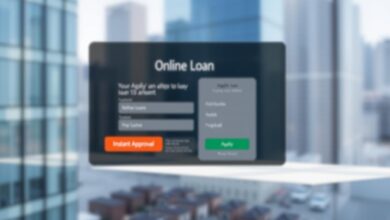Discover the Best Home Equity Loan Rates in Your Area
As of May 14, 2025, home equity loan rates have been changing. They range from 8.36% for a 5-year loan to 8.52% for a 10-year loan, Bankrate reports. These changes can greatly affect homeowners’ financial choices when they want to use their property’s value.
It’s important to know the current best home equity loan rates. We’ll look into how these rates change and what affects them. This will help homeowners make smart choices.
Key Takeaways
- Home equity loan rates are fluctuating, with averages between 8.36% and 8.52%.
- Understanding current rates is crucial for homeowners.
- Various factors influence home equity loan rates.
- Comparing rates can help homeowners make informed decisions.
- Staying updated on market trends is essential.
Understanding Home Equity Loans and Their Benefits
Using your home’s equity can be a smart financial move. First, you need to know how home equity loans work. We’ll cover the basics, benefits, and common uses. This will help you make smart choices about your money.
What is a Home Equity Loan?
A home equity loan lets homeowners borrow money using their home’s equity. These loans have fixed interest rates and predictable payments. This makes it easier to budget.
Advantages of Home Equity Loans
Home equity loans have many benefits. They often have lower interest rates than credit cards or personal loans. You get a big sum of money upfront, which is great for big expenses or paying off debt. Plus, the interest might be tax-deductible, but check with a tax advisor.
“Home equity loans can be a valuable financial tool when used wisely. They offer a way to tap into the value of your home to achieve your financial goals.”
Common Uses for Home Equity Funds
People use home equity loans for home renovations, debt consolidation, and big purchases. You can also use them for education, medical bills, or other big financial needs.
| Use | Description | Benefits |
|---|---|---|
| Home Renovations | Funds used to improve or repair the home. | Increases home value, enhances living space. |
| Debt Consolidation | Consolidates high-interest debts into a single, lower-interest loan. | Simplifies finances, reduces interest rates. |
| Major Purchases | Finances significant expenses, such as a car or education. | Provides necessary funds without depleting savings. |
When looking at home equity loans, it’s key to compare current home equity loan rates. Make sure to understand the terms from different lenders to get the best deal.
How Home Equity Loan Rates Are Determined
To understand home equity loans, knowing what affects rates is key. This knowledge helps borrowers get better deals and save money over time.
Factors Influencing Loan Rates
Several important factors shape home equity loan rates. These include economic conditions, credit score, and loan-to-value ratio. Lenders use these to gauge the risk of lending. This means those with a good profile can get low home equity loan rates.
Economic conditions, like inflation and market trends, also affect rates. When the economy grows, rates might go up. But when it slows down, rates can drop to encourage borrowing.
The Role of Credit Scores
A borrower’s credit score is vital in setting their interest rate. A higher score means less risk for lenders, leading to better loan terms. This includes online home equity loan rates that are competitive.
To keep a good credit score, manage your finances well. Pay on time and keep your credit use low. This boosts your chances of getting lower interest rates on your home equity loans.
Understanding Loan-to-Value Ratios
The loan-to-value (LTV) ratio is another key factor for lenders. It shows how much of a home’s value is borrowed. For instance, borrowing $80,000 on a $100,000 home means an 80% LTV ratio.
A lower LTV ratio means less risk for lenders, leading to better rates. To get a lower LTV, have more equity in your home or borrow less.
Current Home Equity Loan Rates in the U.S.
Home equity loan rates in the U.S. are important for homeowners. They help decide if it’s a good time to use their home’s value. Knowing what affects these rates and how they change in different places is key.
Average Rates Across the Country
As of May 14, 2025, the average home equity loan rates were 8.36% for 5-year loans and 8.52% for 10-year loans. These rates give homeowners a starting point for understanding borrowing costs.
Regional Variations
Home equity loan rates change a lot from one place to another. This is because of local economic conditions, how competitive lenders are, and other factors. For example, rates in cities might be different from those in rural areas because of property values and economic stability.
Knowing these differences is crucial for finding the top home equity loan rates in your area.
How to Find Local Rates
To find the best home equity loan rates, check with local banks, credit unions, and online lenders. Comparing rates from different places can help you get the best deal for your loan.
| Loan Term | Average Rate | Regional Variation |
|---|---|---|
| 5-Year Loan | 8.36% | 7.9% – 8.8% |
| 10-Year Loan | 8.52% | 8.1% – 9.0% |
By knowing the current home equity loan rates and their variations, homeowners can make better financial choices. This helps them find the best home equity loan rates for their situation.
Comparing Home Equity Loan Rates
Comparing home equity loan rates is key to saving money. By looking at different lenders, we can find the affordable home equity loan rates out there.
Home equity loan rates greatly affect the cost of borrowing. It’s important to understand these rates well. We’ll look at fixed and variable rates, share tips for finding the best rates, and show how to use online calculators.
Fixed vs. Variable Rates
Choosing between fixed and variable rates is a big decision. Fixed rates stay the same, giving us stable monthly payments.
Variable rates might start lower but can go up, affecting our payments. We need to think about our finances and how much risk we can handle before making a choice.
Rate Shopping Tips
To get the best rates, we should compare offers from various lenders. Here are some tips:
- Look at rates from banks, credit unions, and online lenders.
- Consider using a mortgage broker for more options.
- Check the loan terms, including rates, fees, and repayment periods.
- Read reviews and check the lender’s reputation for reliability.
Using Online Calculators
Online calculators help us compare rates and see the loan’s total cost. By changing interest rates and terms, we can see how they impact our payments and the loan’s total cost.
These calculators help us make a better choice. It’s wise to use several calculators to double-check the results and ensure they’re accurate.
The Application Process for Home Equity Loans
To get the best home equity loan rates, you need to know how to apply. This process has several steps. These steps help lenders figure out if you can get a loan and how much.
Steps to Apply for a Home Equity Loan
Applying for a home equity loan is easy if you’re ready. Here are the main steps:
- Check your credit score and history to ensure there are no errors or surprises.
- Gather necessary financial documents, including income proof and bank statements.
- Research and compare home equity loan rates from various lenders to find the best deal.
- Submit your application, either online or in-person, depending on the lender’s requirements.
- Wait for the lender’s approval, which may involve an appraisal of your property.
Required Documentation
For a home equity loan application, you’ll need:
- Identification proof, such as a driver’s license or passport.
- Income proof, including pay stubs and tax returns.
- Bank statements to verify your financial stability.
- Property documents, such as the deed and mortgage statement.
Having these documents ready can speed up the application. It also helps you get a better loan rate.
Timeline for Loan Approval
The time it takes to get loan approval varies. It can be a few days or several weeks. This depends on your application’s complexity, the lender’s speed, and if an appraisal is needed.
Understanding the application process helps you compare home equity loan rates better. This way, you can make a choice that fits your financial goals.
How to Improve Your Chances of Getting a Better Rate
To get a better home equity loan rate, you need to prepare financially and plan smartly. Focus on your financial health to qualify for low home equity loan rates.
Tips for Boosting Your Credit Score
Your credit score is key to the interest rate you’ll get. Here’s how to boost it:
- Paying bills on time shows you’re responsible.
- Lowering debt improves your credit use ratio.
- Check your credit report for errors and fix them.
By doing these, you’ll make your credit profile better. This makes you more appealing to lenders for online home equity loan rates.

Debt-to-Income Ratio Considerations
Your debt-to-income (DTI) ratio matters a lot to lenders. To better your DTI:
- Pay off debts with high interest to lower monthly payments.
- Don’t take on new debt before applying for a home equity loan.
- Think about merging debts into one, lower-interest loan.
For tips on managing your DTI and getting the best rates, check out CBS News. They offer great advice on securing the lowest home equity loan rate.
Preparing Your Financial Documents
Being ready with your financial documents can help you get approved faster. Make sure you have:
- Recent pay stubs and tax returns.
- Bank statements and investment accounts.
- Proof of any debts or financial commitments.
Being prepared shows lenders you’re financially stable. This could help you qualify for better loan rates.
Potential Risks of Home Equity Loans
Before you apply for a home equity loan, it’s key to know the risks. Home equity loans offer good rates but have risks to consider. Think if this product fits your financial needs.
Assessing Your Financial Situation
Check your finances before getting a home equity loan. Look at your income, expenses, debts, and savings. This helps you see if you can handle the loan payments.
Also, your credit score matters a lot. A better score can get you a lower interest rate. This can save you money on the loan.
Consequences of Defaulting
Defaulting on a home equity loan is a big risk. It could lead to foreclosure and harm your credit score. You might even lose your home.
So, it’s important to understand the loan terms. Know the repayment schedule, interest rate, and fees. This helps you manage the loan well.
Alternatives to Home Equity Loans
If you’re not sure about home equity loans, there are other options. You might look into personal loans, credit cards, or other financing. These could be better for your situation.
Compare these alternatives based on rates, repayment terms, and costs. This way, you can choose the best option for your finances. It helps you avoid risks and meet your financial goals.
Frequently Asked Questions About Home Equity Loans
Homeowners often wonder how much they can borrow and what the closing costs are. We’ll answer these questions to help you understand home equity loans better.
How Much Can I Borrow?
The amount you can borrow depends on your home’s equity, your credit score, and the lender’s rules.
Lenders usually let you borrow up to 80% of your home’s equity. For example, if your home is worth $200,000 and you owe $100,000, you might borrow up to $60,000. This is based on the lender’s maximum loan-to-value ratio.
- Your home’s equity
- Your credit score
- The lender’s loan-to-value ratio policies
What Are the Closing Costs?
Closing costs for home equity loans vary but include origination fees, appraisal fees, and title insurance.
These costs can be 2% to 5% of the loan amount. For a $50,000 loan, you might pay between $1,000 and $2,500 in closing costs.
To find the top home equity loan rates, compare offers from different lenders. This can help you get the most affordable home equity loan rates.

Finding the Right Lender for Your Home Equity Loan
Finding the right lender for a home equity loan is key to getting good rates. You need to look at interest rates, fees, customer service, and the lender’s reputation. These factors are important.
Lender Evaluation Criteria
When choosing a lender, check their home equity loan rates, loan terms, and how well they treat customers. Top lenders offer great rates and excellent service. This makes getting a loan easier.
Top Lenders in the Market
Wells Fargo, Bank of America, and Quicken Loans are known for their competitive rates. It’s smart to compare these lenders to find the best one for you.
By carefully looking at different lenders, you can find the best home equity loan rates. Consider things like interest rates and customer service to make a good choice.









